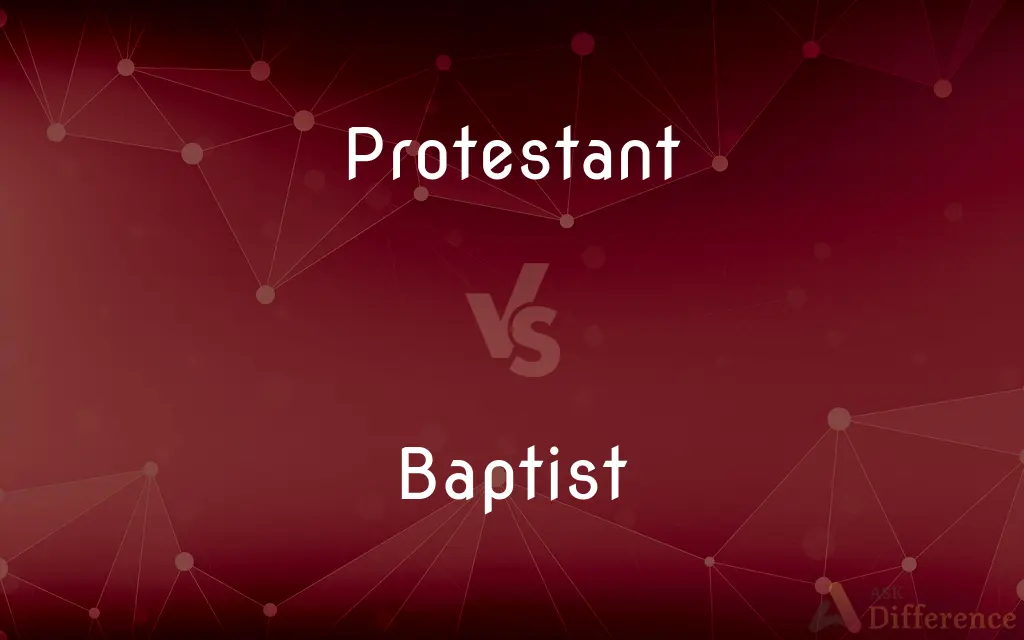Protestant vs. Baptist — What's the Difference?
Edited by Tayyaba Rehman — By Urooj Arif — Updated on March 27, 2024
Protestants embrace diverse beliefs across multiple denominations, while Baptists specifically adhere to baptism for believers only, often by full immersion.

Difference Between Protestant and Baptist
Table of Contents
ADVERTISEMENT
Key Differences
Protestantism is a major branch of Christianity that originated with the Reformation, a movement against what its followers saw as errors in the Roman Catholic Church. Baptists form one of the numerous denominations within Protestantism, distinguished by their practice of believer's baptism and the principle of religious freedom.
Protestants generally accept the Bible as the ultimate authority in matters of faith and practice, rejecting the authority of the Pope and other Catholic traditions. Baptists also prioritize the authority of the Bible, using it as the sole basis for faith and practice, emphasizing personal conversion and the decision to be baptized as an outward sign of faith.
While Protestantism includes a wide range of denominations with varying practices and theological beliefs, such as Lutherans, Anglicans, and Methodists, Baptists are specifically known for their emphasis on baptism of believers by full immersion. This practice is rooted in their belief that baptism should follow a personal, conscious decision to follow Christ, differing from infant baptism practiced in many other Protestant denominations.
Protestant services can vary widely, incorporating different liturgies, forms of worship, and degrees of ritual. Baptist worship services tend to focus on Bible reading, preaching, and congregational singing, with a significant emphasis on evangelism and missionary work.
Governance within Protestant denominations can range from hierarchical structures, as seen in Anglicanism, to more congregational systems where each church operates independently. Baptists typically adhere to a congregational form of governance, valuing the autonomy of the local church and the priesthood of all believers, meaning every Christian has direct access to God without the need for a mediating priesthood.
ADVERTISEMENT
Comparison Chart
Origins
Emerged from the Reformation in the 16th century.
A denomination within Protestantism, developed in the 17th century.
Authority
Bible as the supreme authority; various creeds and confessions.
Bible as the sole authority in all matters of faith and practice.
Baptism
Practices vary; includes infant and believer’s baptism.
Believer’s baptism by full immersion only.
Worship Services
Varies widely across denominations.
Focus on preaching, Bible reading, and congregational singing.
Governance
Ranges from hierarchical to congregational.
Congregational, emphasizing local church autonomy.
Compare with Definitions
Protestant
A member of the Christian churches that separated from the Roman Catholic Church during the Reformation.
Lutherans and Anglicans are among the largest Protestant denominations.
Baptist
Emphasizes the authority of the Bible and the autonomy of the local church.
Baptist churches are self-governing and make decisions independently of a central authority.
Protestant
Includes a wide variety of denominations with diverse practices.
The Protestant tradition encompasses a broad spectrum from evangelical to mainline churches.
Baptist
Advocates for religious freedom and separation of church and state.
Baptists have historically been champions of religious liberty and freedom of conscience.
Protestant
Governance structures vary from hierarchical to democratic.
The Episcopal Church has a hierarchical structure, while many evangelical churches are more congregational.
Baptist
A denomination within Protestant Christianity known for practicing believer's baptism.
Baptists insist that baptism is only for those who have personally professed faith in Christ.
Protestant
Practices can include both infant and believer's baptism.
Methodists and Presbyterians practice infant baptism as a sign of God's covenant.
Baptist
Typically practices baptism by full immersion.
Baptist baptismal services involve immersing the believer completely in water.
Protestant
Emphasizes justification by faith alone and the authority of Scripture.
Protestant theology was significantly shaped by Martin Luther's teachings.
Baptist
Prioritizes evangelism and missionary work.
Baptists are actively involved in missionary work both locally and internationally.
Protestant
A member of a Western Christian church whose faith and practice are founded on the principles of the Reformation, especially in the acceptance of the Bible as the sole source of revelation, in justification by faith alone, and in the universal priesthood of all the believers.
Baptist
A member of an evangelical Protestant church of congregational polity, following the Reformed tradition in worship and believing in freedom of conscience, separation of church and state, and baptism only of voluntary, conscious believers.
Protestant
A member of a Western Christian church adhering to the theologies of Luther, Calvin, or Zwingli.
Baptist
Baptist One that baptizes.
Protestant
One of the German princes or cities that supported the doctrines of Luther and protested against the decision of the second Diet of Speyer (1529) to enforce the Edict of Worms (1521) and deny toleration to Lutherans.
Baptist
A person who baptizes.
Protestant
Protestant (also prə-tĕstənt) One who makes a declaration or avowal.
Baptist
One who administers baptism; - specifically applied to John, the forerunner of Christ.
Protestant
Of or relating to Protestants or Protestantism.
Baptist
One of a denomination of Christians who deny the validity of infant baptism and of sprinkling, and maintain that baptism should be administered to believers alone, and should be by immersion. See Anabaptist.
Protestant
Alternative case form of Protestant
A protestant effort
Protestant work ethic
Baptist
Follower of Baptistic doctrines
Protestant
Protesting.
Baptist
Of or pertaining to or characteristic of the Baptist church;
Baptist baptismal practices
A Baptist minister
Protestant
One who protests; a protester.
Protestant
Alternative case form of Protestant
Protestant
One who protests; - originally applied to those who adhered to Luther, and protested against, or made a solemn declaration of dissent from, a decree of the Emperor Charles V. and the Diet of Spires, in 1529, against the Reformers, and appealed to a general council; - now used in a popular sense to designate any Christian who does not belong to the Roman Catholic or the Greek Church.
Protestant
Making a protest; protesting.
Protestant
Of or pertaining to the faith and practice of those Christians who reject the authority of the Roman Catholic Church; as, Protestant writers.
Protestant
An adherent of Protestantism
Protestant
The Protestant churches and denominations collectively
Protestant
Of or relating to Protestants or Protestantism;
Protestant churches
A Protestant denomination
Protestant
Making a protest
Common Curiosities
Can Baptists be considered Protestants?
Yes, Baptists are a part of the wider Protestant tradition, sharing many foundational beliefs while holding some distinct practices and emphases.
What defines a Protestant?
A Protestant is a member of any of the Christian denominations that originated from the Reformation, characterized by certain core doctrines like justification by faith and the authority of the Bible.
Why do Baptists emphasize the autonomy of the local church?
Baptists believe that each local church should be self-governing and free to determine its worship, doctrine, and practice, based on the Bible, without interference from a central ecclesiastical authority.
What is the significance of baptism in Baptist belief?
Baptism is a significant act of obedience and public declaration of faith in Christ, symbolizing the believer's death to sin and new life in Jesus. It is only performed on individuals who have made a personal decision to follow Christ.
How do worship services differ between Protestants and Baptists?
Worship services can vary significantly among Protestant denominations in terms of liturgy, rituals, and formality. Baptist services typically focus on Bible preaching, prayer, and congregational singing, with less emphasis on liturgical elements.
What is the historical background of the Baptist denomination?
Baptists emerged in the 17th century from the English Separatist movement, which sought to establish churches independent of the state-controlled Church of England. They emphasized believer's baptism and religious freedom.
Is there a central authority that governs all Baptist churches?
No, there is no central ecclesiastical authority governing Baptist churches; each congregation is autonomous and governs its affairs independently.
Do all Protestants agree on the method of baptism?
No, Protestant denominations vary in their practices and beliefs regarding baptism, with some practicing infant baptism and others, like Baptists, insisting on believer’s baptism by immersion.
How do Baptists differ from other Protestants?
Baptists are distinguished by their practice of believer's baptism by full immersion and strong emphasis on the autonomy of the local church and the authority of the Bible.
What role does the Bible play in Protestant and Baptist beliefs?
In both Protestantism and Baptist tradition, the Bible is considered the ultimate authority on matters of faith and doctrine. However, Baptists often emphasize the Bible's sole authority more strongly.
How do Baptists view the relationship between church and state?
Baptists advocate for the separation of church and state, believing that the government should not interfere with religious matters and that individuals should have the freedom to practice their religion without state intervention.
Share Your Discovery

Previous Comparison
Testamur vs. Testimonial
Next Comparison
Iyer vs. IyengarAuthor Spotlight
Written by
Urooj ArifUrooj is a skilled content writer at Ask Difference, known for her exceptional ability to simplify complex topics into engaging and informative content. With a passion for research and a flair for clear, concise writing, she consistently delivers articles that resonate with our diverse audience.
Edited by
Tayyaba RehmanTayyaba Rehman is a distinguished writer, currently serving as a primary contributor to askdifference.com. As a researcher in semantics and etymology, Tayyaba's passion for the complexity of languages and their distinctions has found a perfect home on the platform. Tayyaba delves into the intricacies of language, distinguishing between commonly confused words and phrases, thereby providing clarity for readers worldwide.















































